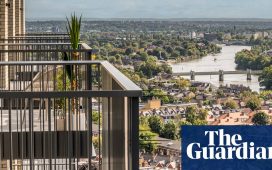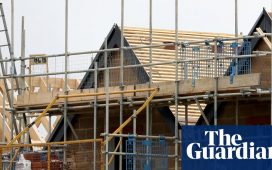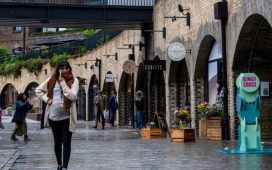A multimillion-pound luxury penthouse flat named after the revolutionary socialist thinker Friedrich Engels is the latest example of Manchester repurposing its radical history for profit, local people have said.
The apartment is in the east tower in Deansgate Square, where the developer Renaker says its vision for the “New Jackson” skyscraper district “is to create a sustainable and attractive neighbourhood where people feel proud to call home”.
The tower stands just off Deansgate, in what was once a slum area of Manchester, where families lived in squalid and cramped homes, and grinding poverty. It is also just a few hundred metres from a statue of Engels, which stands outside the Home arts centre.
The German philosopher spent more than two decades in Manchester in the mid-19th century, from where he researched his seminal work The Condition of the Working Class in England.
The book is a study on the Victorian industrial working class, which highlighted the issue of overcrowded housing, as well as high mortality rates and poor working conditions.
Today, there is incredibly high demand for affordable housing in Manchester, with more than 15,000 applications on the waiting list for social housing.
According to the property website Rightmove, the average price for a property in Manchester is £300,521, with the average selling price for flats at £200,652.
The 290 sq metre (3,126 sq ft) flat is listed on the developer’s website as a showhome, but in promotional material it was advertised with a price tag of £2.5m.
A second penthouse apartment, “The Turing” – presumably named after the University of Manchester computer scientist Alan Turing – is also on the market for £2.5m.
“The Engels” features three en suite bedrooms, as well as a home office and a sweeping open-plan living area.
“It’s just another iteration of that thing that Manchester’s been very good at doing, which is reabsorbing radical elements of its history into a brand,” said Isaac Rose, from Greater Manchester Tenants Union.
“[Engels] deliberately fled the life of the bourgeoisie to live and be among the working class, but maybe he’d have found it ultimately amusing that things have got this mad that they were naming penthouses after him.”
The affordable housing crisis in Manchester, Rose said, was “pretty bad”.
“We see the effects of it every day,” he added. “A mix of lack of social stock, rent rises in the private rental sector by quite substantial margins, and those two things combining to mean that the only option for people is to be put in temporary accommodation.
after newsletter promotion
“Especially in the areas immediately south of where those towers are – Hulme, Moss Side – [there have been] massive rent rises, and if people are kicked out of their private rented home it’s very unlikely they’ll be able to find anywhere in the area … you’ve got this kind of expulsion of people from their neighbourhoods.”
Jonathan Schofield, a writer and guide who runs Engels tours of Manchester, said: “It’s actually built on a slum, if you go back in history. Basically it was very, very densely packed terraced housing, and now, 350ft up or something, there’s a penthouse named after the one who wanted to see the end of all that.”
Describing the name as “hilarious”, he asked: “How did anybody think this was relevant? Did they just read a list of names and thought ‘Oh they’re quite famous, let’s put his name up there.’ The father of modern communism, with Karl Marx, who believed in common ownership.”
In more recent times, the site of the development, on the edge of the city centre, was a car park, but the immediate area is now home to thousands of people.
“Friedrich Engels is an important historical figure, and wrote a lot about Manchester in the mid-1800s, describing parts of the centre of Manchester as hell on Earth,” councillor Gavin White, Manchester city council’s cabinet member for housing said.
“We are pleased to see that Manchester has grown and improved a lot since then, and we are committed to seeing more decent, safe, affordable housing in sustainable communities all across the city, including in the city centre.
“New housing development will often refer to historical Manchester figures such as Engels or Alan Turing in their developments as part of placing their developments in the historical context of our city.
“I hope those who move in to these developments will look at what the history of our city tells us about how the future should be looked at too.”










